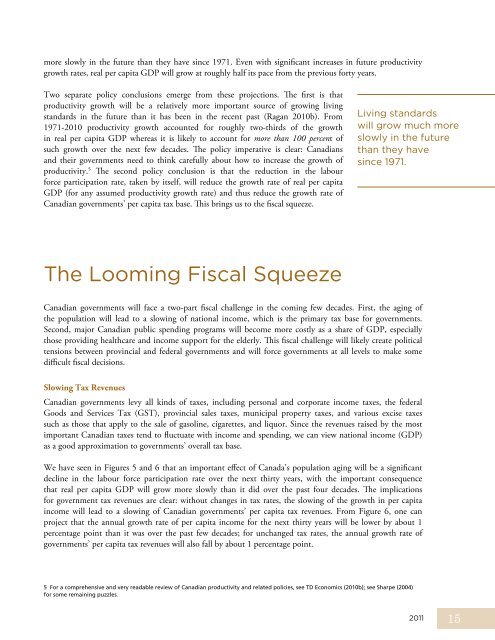Christopher Ragan, "Canada's Looming Fiscal Squeeze," November
Christopher Ragan, "Canada's Looming Fiscal Squeeze," November
Christopher Ragan, "Canada's Looming Fiscal Squeeze," November
You also want an ePaper? Increase the reach of your titles
YUMPU automatically turns print PDFs into web optimized ePapers that Google loves.
more slowly in the future than they have since 1971. even with significant increases in future productivity<br />
growth rates, real per capita GDP will grow at roughly half its pace from the previous forty years.<br />
Two separate policy conclusions emerge from these projections. The first is that<br />
productivity growth will be a relatively more important source of growing living<br />
standards in the future than it has been in the recent past (ragan 2010b). From<br />
1971-2010 productivity growth accounted for roughly two-thirds of the growth<br />
in real per capita GDP whereas it is likely to account for more than 100 percent of<br />
such growth over the next few decades. The policy imperative is clear: Canadians<br />
and their governments need to think carefully about how to increase the growth of<br />
productivity. 5 The second policy conclusion is that the reduction in the labour<br />
force participation rate, taken by itself, will reduce the growth rate of real per capita<br />
GDP (for any assumed productivity growth rate) and thus reduce the growth rate of<br />
Canadian governments’ per capita tax base. This brings us to the fiscal squeeze.<br />
The <strong>Looming</strong> <strong>Fiscal</strong> <strong>Squeeze</strong><br />
Living standards<br />
will grow much more<br />
slowly in the future<br />
than they have<br />
since 1971.<br />
Canadian governments will face a two-part fiscal challenge in the coming few decades. First, the aging of<br />
the population will lead to a slowing of national income, which is the primary tax base for governments.<br />
Second, major Canadian public spending programs will become more costly as a share of GDP, especially<br />
those providing healthcare and income support for the elderly. This fiscal challenge will likely create political<br />
tensions between provincial and federal governments and will force governments at all levels to make some<br />
difficult fiscal decisions.<br />
Slowing Tax Revenues<br />
Canadian governments levy all kinds of taxes, including personal and corporate income taxes, the federal<br />
Goods and Services Tax (GST), provincial sales taxes, municipal property taxes, and various excise taxes<br />
such as those that apply to the sale of gasoline, cigarettes, and liquor. Since the revenues raised by the most<br />
important Canadian taxes tend to fluctuate with income and spending, we can view national income (GDP)<br />
as a good approximation to governments’ overall tax base.<br />
We have seen in Figures 5 and 6 that an important effect of Canada’s population aging will be a significant<br />
decline in the labour force participation rate over the next thirty years, with the important consequence<br />
that real per capita GDP will grow more slowly than it did over the past four decades. The implications<br />
for government tax revenues are clear: without changes in tax rates, the slowing of the growth in per capita<br />
income will lead to a slowing of Canadian governments’ per capita tax revenues. From Figure 6, one can<br />
project that the annual growth rate of per capita income for the next thirty years will be lower by about 1<br />
percentage point than it was over the past few decades; for unchanged tax rates, the annual growth rate of<br />
governments’ per capita tax revenues will also fall by about 1 percentage point.<br />
5 For a comprehensive and very readable review of Canadian productivity and related policies, see TD Economics (2010b); see Sharpe (2004)<br />
for some remaining puzzles.<br />
2011<br />
15





